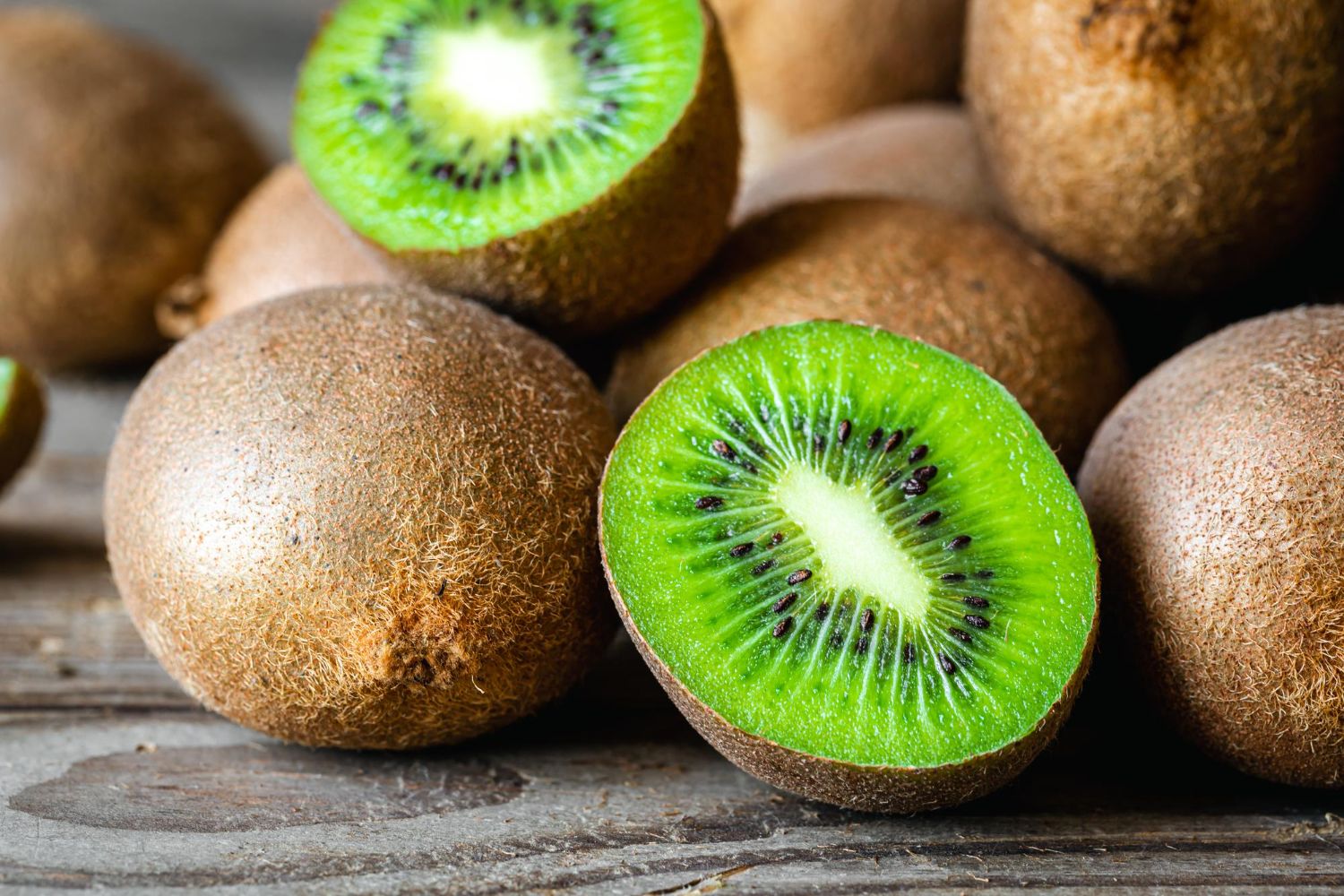In the realm of fruits, the kiwi stands out not just for its unique taste and vibrant green color but also for its exceptional nutritional profile. Let’s delve into the world of kiwi nutrition, health benefits, origin, types, and how to incorporate this powerhouse fruit into your diet.
Kiwi Origin and Varieties
Originally native to China, kiwi fruit is now cultivated in various parts of the world, including New Zealand, Italy, and California. There are several types of kiwi, with the most common being the fuzzy kiwi (Actinidia deliciosa) and the golden kiwi (Actinidia chinensis).
Fuzzy Kiwi (Actinidia deliciosa)
Fuzzy kiwi, also known as green kiwi, originates from China and was later introduced to New Zealand, where it gained widespread popularity. It is the most commonly cultivated variety of kiwi worldwide.
Fuzzy kiwi is characterized by its brown, fuzzy skin and vibrant green flesh speckled with tiny black seeds.
Golden Kiwi (Actinidia chinensis)
Golden kiwi, also known as yellow kiwi or SunGold kiwi, originates from China and was first commercially cultivated in New Zealand. It gained popularity for its unique taste and smooth texture.
Golden kiwi features a smooth, bronze-colored skin with patches of gold and vibrant yellow flesh dotted with tiny, edible seeds.
Compared to fuzzy kiwi, golden kiwi tends to have a sweeter flavor profile with hints of tropical and citrus notes. It is often described as less tart and more mellow, making it a favorite among consumers.
Fuzzy kiwi and golden kiwi boasts a rich nutritional profile. They are excellent source of vitamin C, vitamin K, vitamin E, folate, potassium, fiber, and antioxidants, offering numerous health benefits.
Whether you prefer the traditional fuzzy kiwi or the sweeter golden kiwi, both varieties offer a delightful culinary experience and contribute to a healthy diet.
Kiwi Nutrition
Kiwi fruit, also known as Chinese gooseberry, is renowned for its rich nutrient content. Packed with vitamins, minerals, and antioxidants, kiwi offers a myriad of health benefits.
Kiwi is a nutritional powerhouse, boasting high levels of vitamin C, vitamin K, vitamin E, folate, potassium, and fiber. A single serving of kiwi provides more than the recommended daily intake of vitamin C. It supporting immune function, skin health, and collagen synthesis.
Calories in Kiwi Fruit
Despite its impressive nutritional profile, kiwi is relatively low in calories. One medium-sized kiwi contains approximately 50 calories, making it a guilt-free snack option.
Health Benefits of Kiwi
- Immune Support: The abundant vitamin C in kiwi enhances immune function, helping the body fight off infections and illnesses.
- Digestive Health: With its high fiber content, kiwi promotes digestive regularity and may alleviate constipation.
- Heart Health: Potassium in kiwi helps regulate blood pressure, reducing the risk of heart disease and stroke.
- Skin Health: Vitamin E in kiwi acts as an antioxidant, protecting the skin from damage caused by free radicals and promoting youthful skin.
- Blood Sugar Control: The fiber and low glycemic index of kiwi contribute to stable blood sugar levels, making it suitable for diabetics.
Nutrition – Benefits of Eating Kiwi
Incorporating kiwi into your diet can offer a plethora of benefits, ranging from enhanced immunity to improved digestion and heart health. Whether eaten fresh, blended into smoothies, or added to salads and desserts, kiwi adds a burst of flavor and nutrition to any meal.
Advantages of Kiwi Fruit
- Low in calories and fat
- High in vitamins, minerals, and antioxidants
- Supports immune function and heart health
- Promotes digestive health and skin vitality
Kiwi – How to Eat
Enjoying kiwi is a breeze. Simply wash the fruit thoroughly, then cut it in half or slice it. Some people prefer to peel the fuzzy skin, while others eat it along with the flesh for added fiber. Kiwi can be eaten on its own, added to fruit salads, yogurt, cereal, or used as a topping for pancakes and waffles.
Here are some ideas on how to use kiwi
Fresh Fruit Salad
Slice kiwi and combine it with other fruits like strawberries, oranges, and grapes to create a vibrant and refreshing fruit salad. You can also add a splash of citrus juice or honey for extra flavor.
Smoothies
Blend kiwi with other fruits like banana, pineapple, or mango along with yogurt or almond milk to create delicious and nutritious smoothies. You can also add spinach or kale for an added nutrient boost.
Tropical Salsa
Dice kiwi and mix it with diced mango, red onion, jalapeno, cilantro, lime juice, and a pinch of salt to create a flavorful tropical salsa. Serve it with grilled fish, chicken, or tacos for a burst of fresh flavor.
Fruit Skewers
Thread slices of kiwi onto skewers along with other fruits like strawberries, pineapple, and melon to create colorful and fun fruit skewers. These make for a healthy and visually appealing snack or dessert option.
Kiwi Parfait
Layer sliced kiwi with Greek yogurt and granola in a glass to create a delicious and nutritious parfait. You can also add other fruits or nuts for additional texture and flavor.
Fruit Toppings
Use sliced kiwi as a topping for oatmeal, pancakes, waffles, or yogurt bowls. Its sweet and tangy flavor adds a refreshing element to breakfast dishes.
Frozen Treats
Blend kiwi with coconut water and a touch of honey, then pour the mixture into ice pop molds and freeze for homemade kiwi popsicles. You can also blend kiwi with frozen bananas to create creamy kiwi banana “nice” cream.
These are just a few ideas to inspire you to use kiwi in various ways. Get creative and experiment with different recipes to discover new and delicious ways to enjoy this versatile fruit!
Kiwi Nutrition
In conclusion, kiwi fruit is a nutritional powerhouse, offering an array of health benefits in a delicious and convenient package. Whether you’re looking to boost your immune system, support heart health, or improve digestion, kiwi deserves a place in your diet. So, indulge in this delectable fruit and reap the rewards of its nutritional goodness.

